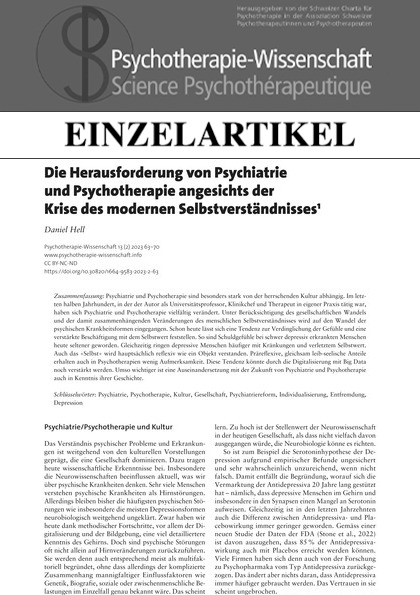The challenge of psychiatry and psychotherapy facing the crisis of modern self-understanding
DOI:
https://doi.org/10.30820/1664-9583-2023-2-63Keywords:
psychiatry, psychotherapy, culture, society, psychiatric reform, individualization, alienation, depressionAbstract
Psychiatry and psychotherapy are particularly dependent on the prevailing culture. In the last half century, during which the author has worked as a university professor, clinic director and therapist in private practice, psychiatry and psychotherapy have changed in many ways. Taking into account the changes in society and the related changes in the human self-image, the book deals with the changes in the forms of mental illness. Already today, a tendency towards the reification of feelings and an increased preoccupation with self-worth can be observed. For example, feelings of guilt have become rarer in severely depressed people today. At the same time, depressed people wrestle more often with slights and injured self-worth. The «self» is also mainly understood reflexively like an object. Pre-reflexive, as it were bodily-mental parts receive little attention in psychotherapies as well. This tendency could be further strengthened by digitalization with Big Data. This makes it all the more important to deal with the future of psychiatry and psychotherapy, also in knowledge of their history.
Downloads
How to Cite
Hell, D. (2023). The challenge of psychiatry and psychotherapy facing the crisis of modern self-understanding. Psychotherapie-Wissenschaft, 13(2), 63–70. https://doi.org/10.30820/1664-9583-2023-2-63
Issue
Section
Special Issue
License

This work is licensed under a Creative Commons Attribution-NonCommercial-NoDerivatives 3.0 Unported License.
This journal provides open access to its content in accordance with the basic premise that the free public availability of research benefits the exchange of knowledge throughout the world.
Authors wishing to publish in this journal agree to the following:
- The author/s retain/s the copyrights and consent/s to initial publication of the work in the journal under a Creative Commons Attribution licence, which allows third parties to use the work by citing the name/s of the author/s and this journal as initial publisher (in accordance with the Creative Commons Attribution-NonCommercial-NoDerivs 3.0 DE-Licence).
- The author/s can enter into additional contracts for the non-exclusive distribution (e.g. publish in a collection or book) of the version published in the journal, if the journal is cited as initial publisher.


